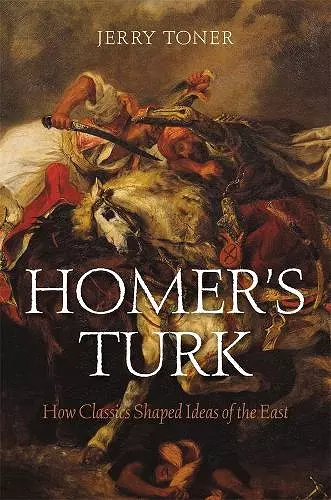Homer's Turk
How Classics Shaped Ideas of the East
Format:Hardback
Publisher:Harvard University Press
Published:4th Apr '13
Currently unavailable, and unfortunately no date known when it will be back

An eminently readable, well documented, and informative book. -- Dimitri Gutas, Yale University In this stimulating study, Jerry Toner guides us through an extensive body of English political works, historiography, and travel literature dating from medieval times through to the present that draw upon classical Greek and Roman authors to create images of Islam and the East. -- Richard Hingley, Durham University Toner is a passionate and illuminating guide on the fascinating subject of how the classics has for centuries molded our perceptions of the East and continues to do so today. -- Madeline Miller, author of The Song of Achilles
Spanning the Crusades, the Indian Raj, and the postwar decline of the British Empire, Homer’s Turk illuminates how English writers of all eras have relied on Greek and Roman literature to help them understand the world once called “the Orient.” Even today, the Classics frame the West’s relationship with the Islamic world, India, and China.
A seventeenth-century English traveler to the Eastern Mediterranean would have faced a problem in writing about this unfamiliar place: how to describe its inhabitants in a way his countrymen would understand? In an age when a European education meant mastering the Classical literature of Greece and Rome, he would naturally turn to touchstones like the Iliad to explain the exotic customs of Ottoman lands. His Turk would have been Homer’s Turk.
An account of epic sweep, spanning the Crusades, the Indian Raj, and the postwar decline of the British Empire, Homer’s Turk illuminates how English writers of all eras have relied on the Classics to help them understand the world once called “the Orient.” Ancient Greek and Roman authors, Jerry Toner shows, served as a conceptual frame of reference over long periods in which trade, religious missions, and imperial interests shaped English encounters with the East. Rivaling the Bible as a widespread, flexible vehicle of Western thought, the Classics provided a ready model for portrayal and understanding of the Oriental Other. Such image-making, Toner argues, persists today in some of the ways the West frames its relationship with the Islamic world and the rising powers of India and China.
Discussing examples that range from Jacobean travelogues to Hollywood blockbusters, Homer’s Turk proves that there is no permanent version of either the ancient past or the East in English writing—the two have been continually reinvented alongside each other.
Expertly traces how the Greek and Roman classics were used in constructing images of the East...This brisk and intelligent study shows the extent to which the classics created many of the presumptions (and prejudices) of the modern political world. -- Stuart Kelly * The Scotsman *
In this erudite work of survey, synthesis, and analysis, Toner examines the ways in which English historians and travel writers used the classics as a scaffold for understanding and constructing images of the East through allusion and analogy. His scope is both broad and deep, exploring English notions of Islam, Arabs, and Turks, from the first forays into the Orient through the decline of British imperial might in the postwar period. The real strength of this work is the framework Toner establishes, arguing the flexibility of the classics, and their utility as a mechanism for British social cohesion and as a tool to separate Britain from the East...This is an excellent piece of scholarship. -- Evan Anderson * Library Journal *
[Homer's Turk] gently chips away at modern scholarship about Western writing about the Orient...The merit of Toner's book lies in disabusing ideas generated by 'Orientalism.' Homer's Turk explores the world of early Western travel writing and observations about the Middle East and India. The question he tries to answer is how Europeans, who lacked any frame of reference except ancient Greece and Rome, tried to represent the East to their readers. This was a simple enterprise of making sense of a different world. A reading of the book makes clear that links between power and knowledge were more imagined than real. In this, he is among a new generation of writers who have taken a skeptical look at the issue...A splendid effort. -- Siddharth Singh * Mint *
The work makes a useful addition to understanding Western ideology. * Publishers Weekly *
An eminently readable, well documented, and informative book. -- Dimitri Gutas, Yale University
In this stimulating study, Jerry Toner guides us through an extensive body of English political works, historiography, and travel literature dating from medieval times through to the present that draw upon classical Greek and Roman authors to create images of Islam and the East. -- Richard Hingley, Durham University
Toner is a passionate and illuminating guide on the fascinating subject of how the classics has for centuries molded our perceptions of the East and continues to do so today. -- Madeline Miller, author of The Song of Achilles
Writing for a general readership, [Toner] covers in an accessible style a great deal of material from the Byzantine age to the present day, showing numerous ways in which allusions to classical authors have been used to express western (and particularly English) ideas of the East.
-- Tim Rood * Bryn Mawr Classical Review *
This is an engaging, timely study of an important and challenging subject. -- C. E. Bene * Choice *
Toner’s thesis is both convincing and important. Greek and Roman literature did crucially shape subsequent Western perceptions of the Orient and, in doing so, was only slightly less important than biblical references and Christian theological preoccupations. -- Robert Irwin * Literary Review *
ISBN: 9780674073142
Dimensions: unknown
Weight: unknown
320 pages